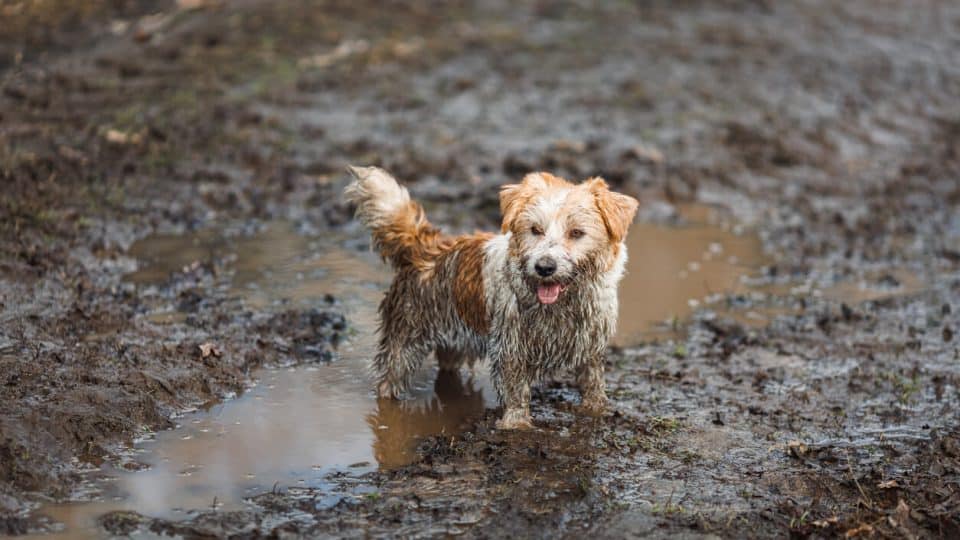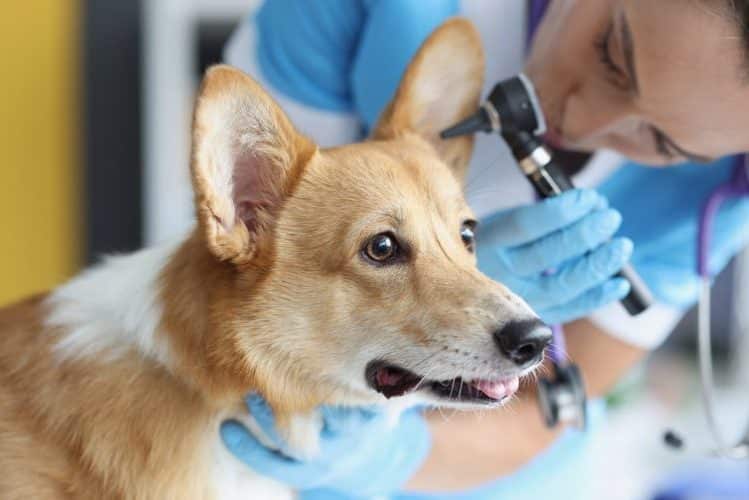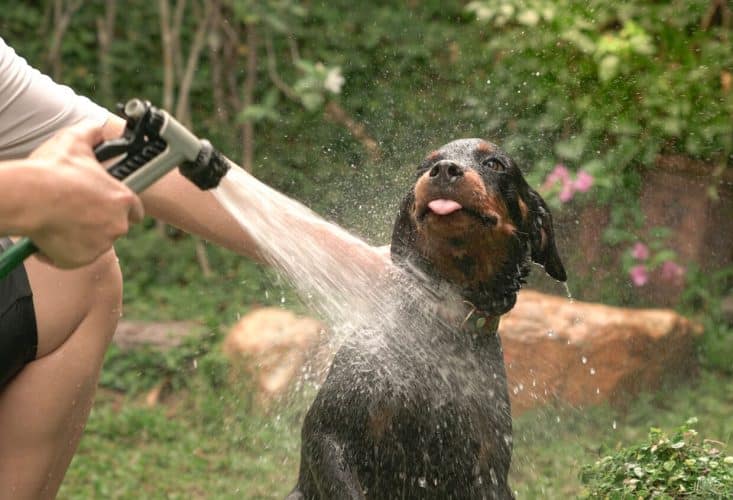- This post contains affiliate links. Read more here.
- Not a substitute for professional veterinary help.
Your dog can be a walking catalog of different scents, from lawn clippings to wet fur. A pungent, fishy smell is one of the more unusual smells you might encounter.
If your dog smells like fish, you don’t necessarily have to worry—sometimes sardine breath and tuna toots are simply the calling card of your dog’s natural microbiome. In other words, some dogs just stink sometimes!
In some cases, though, a fishy smell can point to some serious medical concerns. Possible reasons your dog might smell like fish include:
- Skin and ear infections
- Dental issues
- Urinary tract infections
- Infections in the vagina or uterus
- Anal sac issues
- Ear infections
- Autoimmune diseases
Read on for an in-depth exploration of these causes, plus how to handle them.
Skin And Ear Infections
Skin and ear infections are common culprits for many unusual smells in dogs.
Skin infections
Bacteria like to feed on the oil and sweat present on your dog’s skin. As the bacteria break these products down, they create the smells you know as body odor.
If you notice a funky smell coming from your dog’s skin, you can bathe them with a gentle shampoo. Your groomer may have recommendations for the best shampoo for your pet.
Bathing your dog too often, however, can disturb the natural flora on their skin and coat, so try to limit bathtime to every other week.
Ear infections
An ear infection can cause smells from one or both ears. Infections typically happen in a dog’s outer ear, where trapped moisture or waxy build-up can create an ideal breeding ground for bacteria and yeast.
Your vet can treat ear infections with a professional cleaning that removes smelly debris in the ear canal. They may also prescribe ear drops or an ointment to address the underlying source of the infection.
Does breed matter?
A dog’s breed and body shape can affect their natural smell, as well as their tendency to get ear infections.
For example, Labrador Retrievers, German Shepherds, and Pomeranians have the highest rates of otitis (outer ear infection) and may have smellier ears.
Meanwhile, Golden Retrievers and Cocker Spaniels tend to have oilier coats. The more oil the coat produces, the more likely you’ll notice your dog’s odor.
Wrinkly dogs, like English Bulldogs or Shar Peis, can also develop a specific kind of skin infection called intertrigo. This happens when oils, sweat, and dead skin cells collect in the skin folds.
Obese dogs may also have skin folds that trap these byproducts and attract microbes. When bacteria spread unchecked, they can cause redness, pain, and a musty or fishy odor.
Bad Breath
Does your dog’s breath smell a little fishy? This can happen for a number of reasons.
Unusual diet
Sometimes you can trace your dog’s bad breath back to their diet.
Perhaps your dog has an appetite for stinky “forbidden snacks” like cicadas or cat poop. Or maybe they snagged a fish stick from the dinner table when you weren’t paying attention.
Poor dental hygiene
If your dog gets food trapped between their teeth or has too much plaque buildup, the bacteria inside their mouth can grow quickly. These bacteria produce volatile sulfur compounds that can smell pretty rank.
Brushing your dog’s teeth with an enzymatic toothpaste two to three times a week will help prevent plaque formation and bad breath.
Dental treats and bully sticks can also help clean your dog’s teeth naturally by scraping off plaque and tartar.
Periodontal disease
Periodontal (gum) disease affects 9% to 18% of dogs. Mild periodontal disease, or gingivitis, is quite common and will usually improve good brushing. However, severe gum disease can cause your dog’s teeth to rot or fall out.
“If your dog’s bad breath is consistently foul, this could be a sign of dental issues,” says Dr. Don LeHoullier, DVM and owner of Countryside Veterinary Clinic in Jefferson, OR.
Other signs of dental issues include swollen or bleeding gums and dark yellow or brown plaque buildup.
Dr. LeHoullier says treatment for decaying teeth may include:
- Dental cleaning: This includes scaling and polishing to remove tartar and plaque buildup.
- Extractions: Severely decayed or damaged teeth may need to be extracted to prevent further infection and pain.
- Oral surgery: In some cases, your dog may need more complex oral surgeries to address advanced dental problems.
- Antibiotics: If your dog has an infection, your vet may prescribe antibiotics to treat it.
Diabetes
Advanced stages of diabetes can also affect your dog’s breath, although the smell is usually more fruity than fishy. Dr. LeHoullier says this smell comes from ketones, the chemicals the body produces when it breaks down fat for energy.
When your dog’s body doesn’t make enough insulin, they may make very high levels of ketones to compensate.
More common signs of diabetes include weight loss, reduced appetite, and frequent thirst.
If you notice these signs along with changes in breath, schedule an appointment with your vet as soon as possible.
Urinary Tract Infections (UTIs)
Even though your dog may eat a slightly different diet than you, their urine should smell similar to your urine. If you notice a strong odor you haven’t smelled before, they could have a urinary tract infection (UTI).
UTIs come from bacteria in the urine that doesn’t belong there. This bacteria can cause urine to smell like fish. You may also notice your dog pees more often or has blood in their urine.
As soon as you notice these symptoms, call your veterinarian to schedule an analysis of the urine. They will check for crystals, red blood cells, protein, white blood cells, and any other indicators of a urinary issue. They may also perform a urine culture, where they check for harmful bacteria in your dog’s urine sample.
If your veterinarian suspects a UTI, they will likely put your dog on a course of antibiotics. This medicine should clear up the infection and eliminate the smell.
Anal Sac Issues
A dog’s anal sacs are two specialty scent glands on each side of the anus. These sacs contain an oily material that coats your dog’s stool when they defecate.
To humans, anal gland contents can smell like day-old fish. But for dogs, this material is a scent-based flag that marks their territory. It also provides important social information when dogs sniff each other’s rear ends.
A dog may suddenly leak their anal sacs when they get frightened or stressed. You may also notice dark, oily spots on their rear end—you can wipe these away.
Anal sac disease
A fishy smell from your dog’s butt can also be a sign of anal gland disease. When anal sacs become clogged, the trapped material in the sac may get infected. As bad as the anal sacs usually smell, bacteria-ridden glands can smell even worse.
Your veterinarian or groomer can express the glands manually to give your dog some relief. Your vet may also prescribe antibiotics to clear up an infection.
Some breeds, like the Cavalier King Charles Spaniel or the Bichon Frise, are especially prone to anal sac issues. These dogs may need their anal glands expressed on a regular basis to prevent the sacs from getting swollen and smelly.
Vaginitis Or Pyometra
Female dogs naturally have bacterial flora living in their genital region. You typically won’t smell this at all—even when your dog is in heat.
If you notice a foul odor that smells like fish (or worse), this could mean your dog has a vaginal infection.
Vaginitis
Vaginitis happens when yeast or bacteria infect your dog’s vaginal canal. This most commonly affects dogs who have been spayed, which means they’ve had their uterus and ovaries removed. Dogs with wrinkly genitals are also prone to infection, since the folds of their vulva can trap urine and feces.
You may notice a light and cloudy discharge coming out of your dog’s vulva. Your dog may also lick their vagina or scoot on the floor to remove the smelly, sticky liquid from their rear end.
Your vet can treat most vaginitis cases with antibiotics or antifungals, depending on the underlying infection.
Pyometra
Pyometra is an infection of the uterus. While it usually affects unspayed dogs who still have their uterus, spayed dogs can still develop pyometra if the leftover stump of their uterus gets infected after surgery.
Pyometra may also cause discharge to leak out your dog’s vagina. This discharge is often thick and dark and may contain blood. Your dog may also vomit, refuse to eat, and seem extremely tired.
A uterine infection can quickly become life-threatening. If you think your dog has pyometra, take them to the vet immediately. They may need emergency surgery.
Medical Conditions That Can Make Your Dog Smell Like Fish
Generally speaking, you’ll only notice a fishy odor when you get close to your dog. Severe body odor could be a sign of serious underlying disease.
Autoimmune diseases
Lupus and pemphigus are conditions where your dog’s immune system mistakenly attacks their own skin cells. This attack creates sores and ulcers along your dog’s body. These lesions are prime spots for infection, and they interfere with the skin’s ability to manage its natural oils.
“As these lesions heal, they can emit a distinctive odor. This smell is often a combination of the wound itself and the natural skin oils that have become over-concentrated in the area,” says Dr. Maria Baker, DVM, veterinarian at pet-how.com.
Parasite infestation
Mites can burrow into your dog’s ears and skin, causing a condition called mange. The infested area becomes swollen and itchy, prompting your dog to scratch the area. These scratches open the door for bacteria and mite feces to enter the body.
Your dog’s immune system attacks the invaders, creating a pus that crusts over the skin. It’s this secondary infection, not the mites themselves, that causes mange’s musty, fishy stench.
Sepsis
If an infection continues to spread throughout the body without treatment, your dog may go into sepsis. When this happens, their blood pressure drops, leaving nearby organs and tissues without oxygen. These suffocated tissues begin to die, and their rotting emits an intense odor.
If you think medical issues may cause your dog’s odor, reach out to a vet as soon as possible. They can do an exam to help find the source of the smell and recommend the best approach to treating the odor—and its cause.





